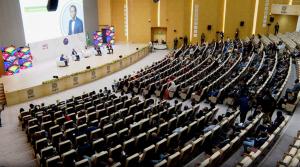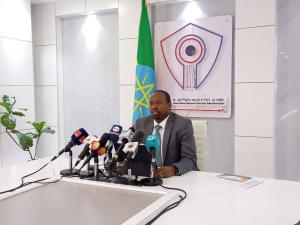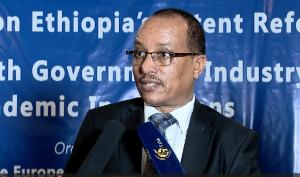Technology - ENA English
Technology
Gov’t Reforms Essential to Further Stimulate Startups Ecosystem: Startuppers
Apr 10, 2024 1571
Addis Ababa, April 10/2024 (ENA) -The reform carried out by the government is favorable for startuppers and further stimulate the sector, youths engaging in startups told ENA. ‘Startup Ethiopia Exhibition’ kicked off at the Science Museum in the presence of senior government officials earlier this week. The exhibition runs from April 4, until April 28, 2024, it was indicated. At the exhibition, youths presented their startups in various sectors including information technology, agriculture, health, education, energy, industry and finance. Meron Sileshi presented her digital application called ‘Lersha', which means ‘for agriculture, at the exhibition. The startup provides a one-stop digital service to smallholder farmers to enable them to access farm inputs, mechanization services, and follow dynamic agro weather condition alerts using technology, she elaborated. For this, Meron stated, the platform combines a mobile application, a call center, and LERSHA agents to facilitate transactions with farmers. As startups are innovative ideas, they will take time for the society to adopt use them, she said, adding that the efforts being underway by the government are essential to promote and further stimulate the ecosystem. Head of Operations at Noliga Engineering PLC, Kassa Dejene, said that on his part, they developed a turbine that can generate energy from any flowing water and a device that can easily generate energy from wind. Noting that they received financial support from the government during the implementation of this innovative work, he said that the new legal system put in place by the government has created a conducive environment for startups. Founder of Simbona Africa, Hana Berhanu on her part said Simbona Africa is a MedTech company engaged in locally manufacturing medical devices in Ethiopia. Simbona has five products and works on any customer-based items. These products are UVC light-based sterilization (non-medical) device, a phototherapy device, an infant radiant warmer, Oxygen Concentrator and Neonate and adult vein finder. She mentioned that they were facing financial constraints while doing these jobs; stating that the activities being carried out by the government to address the financial challenges will motivate startuppers. Recall that the “Startup Ethiopia Forum’’ was held in the presence of Prime Minister Abiy Ahmed at the Adwa Victory Memorial Museum on Thursday, April 4, 2024, where senior government officials, representatives of the private sector, and startuppers attended the forum. The premier noted that “Startup Ethiopia” aims to cultivate an environment conducive to youth entrepreneurship, fostering innovative problem-solving businesses. He also announced several reforms that will create favorable conditions for startups, addressing previous operational bottlenecks.
Digital Payments Offer Enormous Opportunity for Ethiopia, Says Better Than Cash Alliance Africa Lead
Apr 5, 2024 2237
Addis Ababa, April 5/2024 (ENA) There is enormous economic opportunity for Ethiopia to benefit from digital payments, Better Than Cash Alliance Africa Regional Lead Oswell Kahonde told ENA. Speaking to the Ethiopian News Agency on the sidelines of Ethiopia Digital Payment Conference held today, Kahonde said digital payments really help to bring many people into the formal economy and that's the most important thing. At the moment, Ethiopia has a formal economy with 90 million mobile money accounts, an increase like what we've not seen before, he noted, adding that financial inclusion is also growing in Ethiopia. A few years ago, financial inclusion was around 20 percent in the country, and now we're talking of almost 50 percent, Kahonde added. “What this means is that there's also still another 50 percent of the population that is outside the former banking system.” According to him, digital payments help to fast track and accelerate the inclusion agenda that the government is pursuing. The advantage that Ethiopia has is it's coming right to the end, if you compare it with other countries, Kahonde stated. “There is no country in Africa that has ever experienced such exponential growth in digital payments, adoption or digital wallets adoption, 90 million in the space of four or five years. It's a great number.” The demography of Ethiopia is also very encouraging. Over 60 percent of the population is youth, and when you introduce digital they are more likely to adopt digital instruments and digital channels than older people, he elaborated. So, there is a huge opportunity economically for Ethiopia to benefit from digital payments. Kahonde further said that the United Nations Better Than Cash Alliance has been working with Ethiopia, one of the members, since 2016. “We have been working with the Government of Ethiopia to drive digitalization of payments, which has culminated to this exciting conference that we're having here,” the lead pointed out. National Bank Governor Mamo Mihretu said on his part the numbers of mobile money, and credit card users have reached 90 million and 42 million, respectively, over the past five years. The digital payment service of cash transactions across the country has also been significantly increasing and seeing more and more growth. According to him, laying foundation for digital payment in terms of strategies and fostering the overall ecosystem has been recognized by the government and National Bank of Ethiopia. For this reason, the National Bank of Ethiopia launched Ethiopia’s first ever National Digital Payment Strategy several years ago in order to provide framework for how responsible digital systems and payments can drive greater economic efficiency, transparency, financial inclusion and sustained inclusive growth. “The coming together of supportive policies, digital infrastructure and ecosystem players has in the past led tremendous explosion of the use of digital payments,” the Governor said. He revealed that the Bank projects to close the financial year at more than six trillion Birr in value transacted through existing financial channels.
Nile Basin Countries Urged to Use Science, Technology for Sustainable Water Management
Apr 1, 2024 2549
Addis Ababa, April 1/2024 (ENA) Nile Basin countries need to recognize the importance of science and technology as key instruments for sustainable water management in the region, Water and Environmental Engineering Professor Esayas Alemayehu said. In an exclusive interview with ENA, the professor noted that science and technology have huge contribution for sustainable water management in the Nile Basin countries. Elaborating his point the professor stated that there are different aspects of water resources, like infinite water resources. "The Basin is bounded by sea and ocean. There is the Mediterranean Sea in the northern part, the Red Sea in the northeast, and the Indian Ocean in the southern part," he said, adding that "we can therefore try to use the infinite water resources, converting them to freshwater resources that will alleviate and make the water peace and we can manage properly." In this aspect, Professor Esayas pointed out that the integral part is science and technology. If we advance desalination, we can easily convert saline water into freshwater. He cited the experience of countries like Libya and Algeria, indicating that Egypt, which has a large coastal line greater than 2500 km, can also easily extract the water from the Mediterranean Sea to the Red sea with simple technology and alleviate the problem. But, he also stressed the need for properly managing water resources as there is huge water loss in the basin. "If we, for example, advance the science technology in distribution system like what Ethiopia is starting to control the loss by looking at the water pressure in the distribution system and detect leakage we can mitigate the huge loss of water in the region." Besides, the professor advises the Nile Basin countries to utilize used water in order to mitigate some of the problems in water crisis. "In Israel, 85 percent of the water supply for agriculture comes from used water. Nile Basin countries can use such an approach to mitigate some of the problems." Yet, Professor Esayas underscored that cooperation is very important even to advance science and technology. According to him, several researchers have established that the science and technology in the Nile Basin countries are not as expected because the demand is very high. Thus, science and technology need to be accelerated to minimize dispute in the region. He stressed that science and technology work as a bridge to bring the different countries together and to show different directions to ensure the use of an unconventional water resource.
PM Says Nation on Track to Meet Digital Ethiopia 2025 Strategy
Mar 26, 2024 3607
Addis Ababa, March 26/2024 (ENA) Ethiopia is on a good track to realize Digital Ethiopia 2025 Strategy, Prime Minister Abiy Ahmed said. At a panel discussion, which reviewed the mid-term performance of Digital Ethiopia 2025 Strategy at Adwa Victory Memorial Museum today, the premier stated that the main enablers to achieve Digital Ethiopia 2025 Strategy are on a good track. According to him, the country had been facing many challenges financially when the Digital Ethiopia 2025 Strategy was launched. The debt to GDP ratio was about 60 percent, there was no enough money to pay salary and carryout the construction of big projects like the GERD which requires 1 billion USD, he elaborated. The bottlenecks at the time called for a different idea and approach because the problems were unique and required homegrown solutions with some general experiences bench-marked, Abiy noted. As a result, the Homegrown Economic Reform and the Digital Ethiopia 2025 Strategy, among others, were formulated. The prime minister pointed out that the enablers for the strategy included reliable energy supply and robust data infrastructure as well as strong cyber-security, which is a backbone of digitization critical to the success of Digital Ethiopia 2025 Strategy. He further revealed that Ethiopia has laid a strong foundation for technological advancement by prioritizing legal frameworks, strategic planning, institutional development, telecom infrastructure expansion, the establishment of AI institutions, and efforts to address energy challenges. By strengthening the foundations and the enablers that are on good track, Ethiopia's digitization will deliver maximum benefit to its citizens, the PM noted. Abiy announced on the occasion that a national council that oversees the implementation and performance of the Digital Ethiopia 2025 Strategy will be established within the coming weeks. The national council will be led by Deputy Prime Minister Temesgen Tiruneh that consists of representatives from the pertinent institutions and the private sector. Innovation and Technology Minister Belete Molla emphasized on his part the strategy's alignment with Ethiopia's national goals, including the Homegrown Economic Reform Agenda, the Ten-Year National Development Plan, the UN Sustainable Development Goals, and the African Union Continental Digital Transformation Strategy. “Various works have been done in developing these infrastructures in the past three years,” he pointed out. The minister noted that the strategy focuses on national development goals, job opportunities, generation of foreign currency and innovation.
PM Abiy Says Ethiopia Made Strides in Its Digital Transformation Journey
Mar 26, 2024 2981
Addis Ababa, March 26/2024 (ENA) Prime Minister Abiy Ahmed stated that Ethiopia has made significant strides as a nation since beginning our digital transformation journey. The premier wrote on his Face-Book that: “Digital Ethiopia 2025 empowers us to thrive in the digital economy, necessitating support for innovators and the creation of digital enablers.” The performance of Ethiopia Digital 2025 Strategy, part of the Homegrown Economic Reform and the 10-year development plan to ensure technology-based growth is being reviewed. “Today's mid-term review allows us to assess our challenges and celebrate the remarkable milestones we have reached in a short span,” Prime Minister Abiy underlined.
Internal Program Error Cause of CBE Glitch: INSA Finding
Mar 22, 2024 2711
Addis Ababa, March 22/2024 (ENA) The recent glitch the Commercial Bank of Ethiopia (CBE) encountered was caused by flow error during its mobile banking system modification, the Information Network Security Administration (INSA) disclosed today. A flow error refers to a problem that occurs when the logical flow of a program is interrupted or behaves unexpectedly. This can happen when the code branches or loops incorrectly, causing the execution to follow an unintended path. Briefing the media, Information Network Security Administration (INSA) Director-General, Tigist Hamid, said the problem was not caused by an external or internal cyber security attack. “The specific finding from this source analysis shows that the glitch was not a cyber-threat from outside or inside. That is what I can say from INSA's perspective. But it is a bug from the logical flow mismatch that arose from the modification of their digital banking system.” INSA, in collaboration with CBE and the Financial Intelligence Service, has been investigating the cause of the problem, it was learned. According to the director-general, there was neither external nor internal attempted cyber attack against the bank. Tigist finally pointed out that further investigation is required to ensure accountability.
Innobiz-K Ethiopia Incubation Center Inaugurated
Mar 22, 2024 2621
Addis Ababa March 22/2024 (ENA) Innobiz-K Ethiopia, the biggest incubation center in the ICT Park inaugurated today with the aim of creating jobs and fostering ICT oriented entrepreneurship. Innobiz-K Ethiopia is an ICT based innovation center jointly managed by Ministry of Innovation and Technology and KOICA in incubating innovators and entrepreneurs to develop their innovative ideas, Addressing the inauguration of the center, Innovation and Technology State Minister Baysa Bedada said the initiative of the incubation center demonstrates the country's unwavering commitment for innovation and technology. Ethiopia recognizes the critical role of science and technology and innovation as a catalyst for long-term development, to cultivate a flourishing ecosystem that fosters research, entrepreneurship and technological advancements, he affirmed. “By integrating science, technology and innovation into its national agenda, Ethiopia seeks to build resilient institutions. The country is also determined to advance the green economy and foster an inclusive society ensuring that every citizen has equitable access to opportunities for growth and prosperity,” Baysa stated. The state minister further noted that innovation centers are pivotal in driving economic growth and prosperity, serving as vibrant hubs for creativity, collaboration and technological advancement. In a rapidly changing world, Ethiopia is committed to unlocking the nation's potential by empowering innovators and entrepreneurs through fostering a culture of creativity, investing in research and building a robust digital economy, he pointed out. Vice president of Korea International Cooperation Agency (KOICA) Dong Ho Kim said realizing Innobiz-K Ethiopia Incubation Center is a significant milestone in the effort to support entrepreneurs and ICT development in Ethiopia in general. Through a sustainable and collaborative partnership, the Center will be a game-changer, it was indicated. Moreover, Innobiz-K Ethiopia Incubation Center is expected to serve as a key hub for startups and innovative businesses built to realize a strong national startup ecosystem
AAU, FARIS Technology Group Sign Memorandum of Understanding
Mar 19, 2024 2169
Addis Ababa March 19/2024 (ENA) Addis Ababa University (AAU) signed today a Memorandum of Understanding (MoU) with FARIS Technology Group, one of the pioneer space education schools in Ethiopia and technical training center. The MoU would have a paramount role for the two institutes in order to work together in the areas of technology transformation and entrepreneurship. Signing the agreement, AAU Interim President Samuel Kifle said that the agreement will be crucial to enhance the ample potential of students and transform their innovative ideas into the industry. The Memorandum of Understanding is also pivotal to empower the skills and knowledge of students as the private sector has a huge role, he further stated. Finally, the Interim President stressed the need to work with high dedication to implement such significant agreement between the two sides. Founder and CEO of FARIS Technology Group Elias Yirdaw said the FARIS Technology will support students with startups and researches as well as other spheres. The MoU is also anticipated to exploit the abundant potential of students at AAU and create new job opportunities for the youth, it was indicated. The agreement is part of the new strategic plan of the University following its recent autonomous status which focuses on collaborating with the private sector based on mutual benefit.
Simien Mountains Nat'l Park Introduces GPS Tracking System to Protect Endemic Red Fox
Mar 16, 2024 2639
Addis Ababa, March 16/2024 (ENA) Simien Mountains National Park announced that it has introduced GPS tracking system to monitor and safeguard the endemic Red Fox population in the park. The Red Fox Conservation Program Coordinator at the Park, Getachew Assefa told ENA that this tracker has been deployed in collaboration with the Ethiopian Wildlife Protection Authority and international partner organizations. The system introduced is the Collar GPS tracker wherein GPS-enabled collars are attached to the necks of 8 red foxes with forty family members. The tracker enables to trace movements of the foxes as they search for food and navigate through potential threats, he said. By utilizing the system, we can track the distances covered by the foxes each day in their pursuit of sustenance as well as the dangers they encounter along the way, Getachew elaborated. As a pilot project last year, GPS trackers were employed on two red foxes, leading to the acquisition of crucial information when these animals faced life-threatening situations, including death and severe injuries. The Collar GPS tracker also facilitates the tracking and controlling of illegal poaching activities. According to the program coordinator, the red foxes primarily inhabit mountainous regions above an elevation of three thousand meters. Covering an expansive area of four hundred twelve square kilometers, Simien Mountains National Park is not only the largest national park in Ethiopia but also a UNESCO designated international heritage site. It encompasses the highest portions of the Simien Mountains, including Ras Dashan, the highest peak in Ethiopia. The park serves as a sanctuary for numerous endangered species, including the Ethiopian Wolf and the Walia Ibex, a unique wild goat found nowhere else in the world. Additionally, the Simien Mountains park is home to the Gelada Baboon and the caracal, a remarkable feline species. Over 50 bird species, including the bearded vulture with its impressive 3-meter wingspan, inhabit the park.
Ethio Telecom Launches Experience Center at Adwa Victory Memorial
Mar 9, 2024 2812
Addis Ababa, March 9/2024 (ENA) Ethio telecom has inaugurated today an Experience Center at the Adwa Victory Memorial Museum. The center features a retrospective of telecom technological development processes, narrates the current level of technological advancement, and predicts emerging technological development trends. It is also organized to showcase the historical development stages of Ethio telecom, displaying telecom gadgets while highlighting the present and future levels of technological excellence. Launching the Experience Center, CEO of Ethio Telecom, Frehiwot Tamiru said the center provides residential and enterprise customers with the opportunity to exhibit, engage with, and experience the latest technologies firsthand. The center will also showcase existing products and services, allowing customers to test new digital technologies, and explore technological breakthroughs, she added. The center also showcases state-of-the-art technology, presenting verticals such as the health care sector, agriculture, and education, a valuable opportunity to modernize their facilities using cutting-edge solutions, it was indicated. This initiative is also designed to establish a streamlined systems capable of reducing costs, minimizing resource wastage, and enhancing overall productivity ultimately paving the way for the digital transformation of our country. It is instrumental to the ongoing efforts aimed at enhancing our country's digital economy, elevating the standard of living for citizens, and driving societal transformation through technological advancements. The center was planned to function as a testing ground for comprehensive solutions with the potential to drive significant advancements and innovation within the industry, among others, smart Home Automation, tele birr financial transactions, immersive visitor experiences, Fintech integration as well as smart agriculture techniques, smart Tourism services and remote patient monitoring. Ethio telecom has been providing telecom services in Ethiopia for 130 years.
Ministry Urges Partners to Utilize Innovative Approaches in Health
Mar 7, 2024 3176
Addis Ababa, March 7/2024 (ENA) The Ministry of Health has urged partners and stakeholders to cooperate in ensuring quality healthcare services through innovative approaches. The remark was made at the conclusion of the 8th National Healthcare Innovation and Quality Summit under the theme: "Promoting Health System Innovation to Enhance Healthcare Quality, Safety and Equity" today. Speaking on the occasion, Health Minister Dr. Mekdes Daba said more work is required to create and improve the quality of technologies that are important for the improvement of health services in Ethiopia. The summit has created opportunities to exchange best experiences and practices among the participants of the conference and to identify future areas of focus, she added. The minister further underscored the need for quality research to provide quality health services that would help as input for policy and strategy. According to her, hospitals, institutions and regional states have demonstrated that innovative approaches have a great role in making the sector effective and efficient. Dr. Mekdes finally called on all stakeholders to work together to ensure that the health sector provides effective and affordable service and generate additional income. Innovation Hub Head at WHO Headquarters, Louise Agersnap stressed that “we will not be achieving the Sustainable Development Goals by 2030 with the usual approach and mindset. Innovation is needed.” Acknowledging that the health problems across the world are complex and difficult to solve, she noted that there are plenty of evidence based interventions at disposal, many of which are supported by WHO guidelines. Agersnap further elaborated that translating a guideline into better health outcomes can be a challenge, adding that "we are catalyst for collaborative learning across the innovation ecosystem where we're supporting the public sector to embed innovative capabilities within their organizations and leverage it for better health outcomes in a more open, iterative and participatory manner." Innovation and Technology Minister, Belete Molla said innovation and technology works in health have been done in a scattered manner in the health sector. Belete reiterated that his ministry is ready to strengthen the innovation activities in the sector. The three-day summit was attended by various stakeholders, including the UN, regional bureau heads, donors, partners, private health institution heads and professional health associations.
Cyber Security Challenges Require Holistic Approach: DG Tigist
Mar 5, 2024 3095
Addis Ababa, March 5/2024 (ENA) Addressing the challenges of cyber security requires a holistic approach involving collaboration among governments, private sector, and international organizations, Information Network Security Administration (INSA) Director-General Tigist Hamid said. A two-day cyber security and digital transformation conference organized by INSA and Ethiopian Cyber Security Association kicked off today. In her opening remark, Director-General of INSA, Tigist Hamid said that technology underpins every aspect of the society, from financial transactions to vital infrastructure and this reliance puts everyone at risk for never-before-seen dangers. “The rise of AI and the increase of cyber-attacks are known risks within the international community; yet, it does come as a surprise that both of these topics fall within the top five risks for 2024,” she emphasized. Citing the World Economic Forum, 2024 Report, Tigist pointed out that cyber security came in number four in the short-term and eighth in the long-term relating to global risks ranked by severity, and she added “while we should be happy about technological advancements, we also need to be cautious about the risks associated with improper technological understanding.” “In 2024, the cyber security landscape continues to present significant, evolving challenges. We should reassess our security strategies while becoming more nimble, adaptive, and proactive to stay ahead of the curve. The adversaries we face are not confined by borders; they navigate the virtual realm with stealth and sophistication. We must fortify our defenses, collaborate across sectors and borders, and remain vigilant in the face of this persistent danger,” she stressed. Furthermore, the Director-General pointed out the need for holistic approach that involves the collaboration among governments, private sector, and international organizations to address the challenges of cyber insecurity. By the end of 2024, the cost of cyber-attacks on the global economy would top 10.5 trillion USD, she stated, and added that cyber security has evidently become a very critical concern that needs the attention of researchers, academicians, and organizations to confidentially ensure the protection and security. “The quantity, the complexity, the severity of cyber-attacks have also escalated at national level. In Ethiopia, 4,623 cyber-attack attempts were recorded during the first-half of the 2016 fiscal year. In the same period, the percentage of high risk cyber-attacks has more than doubled to 115 percent as compared to the first-six months of 2015 fiscal year report,” Tigist elaborated. According to the Director-General, majority of the institutions targeted by cyber attackers included banks and financial institutions, security and intelligence agencies, media outlets, critical government agencies, federal and regional offices as well as institutions of higher learning.
Int’l Conference deliberating on Cyber Security and Digital Transformation
Mar 5, 2024 2502
Addis Ababa, March 5/2024 (ENA) An international conference is deliberating on cyber security and digital transformation at Skylight Hotel, in Addis Ababa. A two-day conference was opened this morning, by Tigist Hamid, Director General of Information Network Security Administration (INSA) and Berhanu Beyene, President of Ethiopian Cyber Security Association (ECySA). The conference aimed at discussing the importance of digital transformation for strengthening the national cyber ecosystem in Ethiopia, it was indicated. It is anticipated to give inputs to Ethiopia's endeavor for creating a strong cyber security climate that would help to protect its national sovereignty.
Ethiopia Doing Quite Lot of Connectivity: ITU Regional Director for Africa
Feb 24, 2024 3301
Addis Ababa February 24/2024 (ENA) Ethiopia is doing quite a lot in terms of connectivity and practically improving daily in this regard, International Telecommunication Union (ITU) Regional Director for Africa Anne-Rachel Inne said. In an exclusive interview with ENA, Inne said Ethiopia is one of the countries in Africa that has opened up its telecom market. “Now we have two operators, Ethio telecom and Safaricom,” she said, adding the ITU is the UN agency and all telecommunication operators, just like mobile network operators, are members. One of the things that the ITU helps countries do in this case, Ethiopia, is to look into what we can help in terms of regulation, policies that are good for the country and good for operators that want to come in the country, according to the director. “Ethiopia is one of the members of ITU, which means as you have seen, it (Ethiopia) is doing quite a lot in terms of connectivity and improving practically daily. This is wonderful.” “We are looking to stay behind Ethiopia to make sure that this is for the benefit of its people,” she elaborated. Moreover, she elaborated that we have been doing quite a lot actually in telecommunications and infrastructure for connectivity on the continent, including Ethiopia. We are in the process of mapping countries to see where the schools are and how they can be connected, she said. Then, we could see if we could supply infrastructure facilities such as fiber and satellites, she said, adding where appropriate, providing trainings to teaches by organizations like UNESCO. “We are hoping for connecting schools, once we map those schools and we look into how we take connectivity to the schools, it will also help us in terms of augmenting the infrastructure in the countries,” she added. She elaborated what we are trying is to make sure that locally, all of the schools are known; then we can tell how to connect them, for example, if we ever end up in another case where people have to stay home that kids will have access to education. She stressed that connectivity not just for the sake of connectivity but for citizens, for young people, adults, for schools, lifelong education, including people with disabilities, we really want everybody to be included. “We are connecting schools; we are also hoping that we will augment the infrastructure for connectivity on the African continent,” she said. Recall that the International Telecommunication Union has launched Digital Transformation Centers (DTC) in Addis Ababa in 2022 with a view to enhancing the digital capacities of citizens in the country. The DTC initiative will also help Ethiopia to enhance the use of digital technology for teaching and learning, administration, research, among others.
New Data Science Project Launched to Transform Africa's Data Landscape
Feb 20, 2024 3880
Addis Ababa February 20 /2024 (ENA) The African Population and Health Research Center (APHRC) has launched today a new data project titled ‘Data Science Without Borders’ (DSWB), with the objective to transform Africa’s data landscape. The three-year project, launched at a ceremony held at the Africa Center for Disease Control and Prevention (CDC) in Addis Ababa, seeks to make a significant impact by bridging data gaps, strengthening data systems, and enhancing collaboration for data-driven decision-making in Africa. The Wellcome Trust will provide funding for a project worth 5 million USD that is expected to improve reuse and use of data science techniques in Ethiopia, Senegal, and Cameroon, with plans to expand to other member nations of the African Union. The project focuses on developing and improving data analytics skills using robust artificial intelligence tools and capacity building of national teams on machine learning. Speaking at the event, the DSWB Project Lead and Head of Data Science Program, Agnes Kiragga said this launch marks the initiation of a collaborative journey aimed at empowering stakeholders and paving the way for a successful and impactful data science initiative. “This initiative is cognizant of the barriers to effective democratic artificial intelligence and machine learning including lack of data, inadequate data collection infrastructure, limited processes to support data access, including challenges in data collection regulations, storage infrastructure, financial barriers, and lack of data scientists with domain expertise, especially in the resource-limited nations across sub Saharan Africa (SSA).” Moreover, the project developed to strengthen data systems in African health institutions will develop a federated no-code platform for deploying machine learning models used by actors in the selected countries, and create a sustainable environment for a collaborative, replicable, and transferable application of data science tools. “By understanding partner countries' unique challenges and opportunities, we strive to ensure that the DSWB project makes a lasting and positive contribution to the field of data science,” she elaborated. Head of Data Synergy and Evaluations at APHRC, Damazo Kadengye said on his part this project lays a foundation for us to contribute to the building of data systems across African continent.Moreover, it will create opportunities on how we can connect with the governments, especially in supporting them to improve data systems across the continent. “It is very important because it helps us inform policy and planning using evidence that we generate through this project as it is also aligned with AU data policy framework," the head stated. The collaborative project housed under APHRC‘s Data Science Program is being conducted with other implementing partner organizations: The Alan Turing Institute, Armauer Hansen Research Institute (AHRI), the Institute for Health Research, Epidemiological Surveillance and Training (IRESSEF), Douala General Hospital, London School of Hygiene and Tropical Medicine (LSHTM), and the Committee on Data (CODATA). The African Population and Health Research Center (APHRC) is a premier research-to-policy institution, generating evidence, strengthening research and related capacity in the African research and development ecosystem, and engaging policy to inform action on health and development. The Center is Africa-based and African-led, with its headquarters in Nairobi, Kenya, and a West Africa Regional Office in Dakar, Senegal.
Zambia Desirous of Taking Lessons from Ethiopia’s Telecom Sector: Minister of Technology & Science
Feb 18, 2024 3720
Addis Ababa, February 18/2024 (ENA) Zambia is interested to learn from the successful and advanced technologies of Ethiopia, particularly from the telecommunication sector, Zambia's Technology and Science Minister Felix Mutati said. In an exclusive interview with ENA, Mutati said that his country is keen to draw experiences from Ethiopia’s success stories in the telecommunication sector and replicate it. “Ethiopia has advanced quite a bit in technology; particularly in the telecommunication infrastructure. It is ahead of us, Zambia. So my key interest coming to Ethiopia is to learn, appreciate, and not reinvent the wheel. What is it that is brand new that Ethiopians move ahead faster than us? So I will be engaging with my colleagues here that we can compare with us,” he elaborated. African countries need to share experience and knowledge amongst each other, he stated, and stressed that it is key towards ascertaining a united and stronger Africa through partnership and cooperation. “This should be the way that Africa should work in partnership and collaboration, sharing opportunities, knowledge and experience,” the minister of technology and science noted. Moreover, he pointed out that Ethiopia and Zambia can also cooperate in the tourism sector where his country is ready to share its experience. According to him, Zambia’s tourism is booming over the last couple of years due to the measures taken by the government including the removal of visa requirement, upgrading of tourism infrastructure, and expansion of tourist destinations. Ethiopia has various tourist destinations and by addressing the challenges facing the sector, the country can unleash its potential, the minister added.
African Nations Should Revisit Policies, Strategies to Expedite Digital Transformation
Feb 17, 2024 3270
Addis Ababa February 17/2024 (ENA) The Chief Executive Officer of Ethio Telecom Frehiwot Tamiru stressed the need for African countries to revisit their policies and strategies with a view to creating suitable environment to expedite digital transformation in the continent. Ethiopia has organized a high-level side event at the 37th Ordinary Session of the Assembly of the Heads of State and Government of the African Union to highlight the critical role of digital innovations in promoting inclusive and sustainable development in Africa. President Sahile-Work Zewde delivered opening remarks at the event, which was held at the Adwa Science Museum under the theme, "Harnessing Digitization for Africa's Transformation." President Sahle-Work Zewde said that accelerating digital transformation is crucial to ensure inclusive and sustainable development in Africa. Speeding up digitalization is convenient for dealing with pressures and providing quick solutions for problems, she noted, adding that the expansion of digitalization will play a significant role in creating the prosperous Africa we want in 2063. She mentioned Ethiopia's digital transformation in various sectors, including finance, telecommunications, and artificial intelligence, and advocated for a continental transformation in accordance with Agenda 2063. The event drew together stakeholders and leaders from various African countries and financial sectors. In her presentation at the discussion forum, Ethio telecom CEO said African countries should have a policy which is attractive and flexible to encourage new ideas,, innovators, investors that can adequately support the ecosystem. She stressed the need to ensuring technology inclusiveness in order to build better future in a sustainable manner. The CEO said currently there are 1.4 billion mobile telephone subscribers that is expected to reach 1.7 billion by the year 2030. “Africa holds the largest mobile market in terms of registered account and transaction volume.. Today we have around 781 million registered mobile money accounts. We need to leverage these mobile user bases to promote trade integration and enhance Africa’s digital transformation:” The CEO has also emphasized the possibility of building Africa’s digital economy by using the mobile money users’ base that we have today. Professor Landry Signé, a senior fellow in the Global Economy and Development Program and the Africa Growth Initiative at the Brookings Institution, said for his part that digital transformation help Africa become a global powerhouse in terms of economic growth, job creation and poverty reduction as well as enhancing financial, healthcare and education services. He underlined the importance of investing more in primery and secondary education in order to build critical thinking, digital skills, STEM skills in order to help bring economic development.
ENA’s Media Facilities Would Enhance Its Media Competitiveness: Int’l Journalists
Feb 3, 2024 4004
Addis Ababa February 3/2024 (ENA) Some international media correspondents, who visited the newly built Ethiopian News Agency (ENA)’s media complex, said that the media facilities would strengthen its competitiveness in the media market. Following her visit to the state-of-the-art media complex, Bloomberg News Correspondent in Addis Ababa, Fasika Tadesse told ENA that the news agency has been equipped with modern technology that most of the international media is equipped. Early this week, the Ethiopian News Agency inaugurated a media facility that encompasses three TV and four radio studios that are outfitted with state-of-the-art editing and recording equipment vital to producing high-quality contents. “I have visited the three studios of ENA.These are the state-of-the-art and well-equipped studios. The equipment that we have seen would fit the technologies that have been employed in most of the global media outlets..." So I would say I was impressed by the facilities I visited. Those controlling rooms, the cameras and even the screens in those three studios are really very interesting,” the correspondent said. Fasika is also convinced that ENA's utilization of all these modern facilities will raise the quality and of the news, particularly contents of the agency. According to her: “Most of us know ENA for producing text based content most of the time. But I think the studios will help ENA to produce more audiovisual contents with high quality and competitive news and news related contents.” Recall Ethiopian News Agency has served more than eight decades as the primary source of news and news-related stories in the country's media industry. ENA should strive for better quality contents and competitiveness in the changing media landscape, in addition to its endeavors to providing contents to the media outlets, she added. Noting that competition comes from different aspects in the media and communication market, the correspondent urged the agency to effectively exploit its modern facilities. Idris Sabry, a correspondent of the Moroccan Press Agency (MAP) said on his part that the Ethiopian News Agency is equipped with the latest technology in the audio-visual field. The technology facilities will allow ENA to broadcast dialogue, seminars and other major events from Addis Ababa, the capital of Ethiopia, to the rest of the globe. “There are comparative advantages to the Ethiopian News Agency to keep its legacy as a primary source. For instance, Addis Ababa hosts the Headquarters of the African Union (AU), and we all know that tremendous conferences are held in Ethiopian capital. And the studios enable the ENA to give additional value to its work.” Sabry also appreciated the willingness of ENA’s leadership to establish partnerships with various international media outlets based in Addis Ababa for use of these studios for broadcasting news to their audience.
INSA Thwarts Close to 99 Percent Attempted Cyberattacks in Half Year
Jan 31, 2024 3838
Addis Ababa, January 31/2024 (ENA) The Information Network Security Administration (INSA) said it has successfully thwarted 98.56 percent of the 4,623 attempted cyberattacks targeting government and private institutions during the past six months of the Ethiopian Fiscal Year. In his presser today, Information Network Security Administration (INSA) Director-General Solomon Soka said cyberattacks have surged by 115 percent when compared to same period last year. Had the attacks succeeded, the nation could have incurred over 10.5 billion Birr loss, he added. Recognizing the importance of early detection and vulnerability management, INSA had also conducted cyber risk assessment surveys on 7 institutions and the technologies of 149 private and government entities. These assessments identified potential cyberattack risks, enabling the institutions to pro-actively address vulnerabilities and strengthen their defenses, the director-general noted. Stating that INSA also controls technologies imported from different countries, Solomon said the administration banned 338 items out of the 2,999. He pointed out that the banned list included tools that could facilitate telecom fraud such as simboxes, drones, GPS technologies, and satellite equipment. The director general attributed the increase in cyberattacks to a confluence of factors, including the global surge in digitization, the rising financial benefits for attackers, and Ethiopia's own rapid advancements in digital infrastructure. To protect the country from cyberattacks, Solomon emphasized the need for collective action, urging individuals and institutions to raise awareness and prioritize robust cyber security measures.
Ethiopia Revamping Patent System to Encourage Invention Ecosystem, Foster Prosperity
Jan 29, 2024 3874
Addis Ababa January 29/2024 (ENA) Ethiopia is revamping the patent system, aiming to encourage globally competitive inventions and foster development and prosperity, according to the Ethiopian Intellectual Property Authority. Today, the European Patent Office and the authority organized a Symposium on Ethiopia's Patent Reforms; meeting with government, industry, and academic institutions. Ethiopian Intellectual Property Authority Director-General Woldu Yemessel on the occasion said his authority is revamping the nation's patent system aiming to encourage globally competitive inventions and facilitate development and prosperity. Recognizing the crucial role of intellectual property in fostering innovation, the authority is actively collaborating with the European Patent Office to modernize Ethiopia's patent landscape. The authority’s multifaceted reforms encompass revising the patent proclamation, establishing a framework for protecting traditional knowledge, developing a geospatial information proclamation, and crafting a National Intellectual Property Policy Strategy. These initiatives aim to create a robust and comprehensive intellectual property ecosystem that fosters creativity, protects inventors' rights, and attracts foreign investment, it was learned. European Patent Office has been supporting the authority to revise the patent proclamation and connecting Ethiopian universities with European patent system resources, he pointed out. So far, two Ethiopian universities are connected to these resources and eight more will be added to the list, he stated. To improve the patent system, the authority has embarked on a revision of the patent proclamation, a draft of traditional knowledge and geospatial proclamation, it was learned. European Patent Office Regional Desk Coordinator Nicholas Kornig said his office will continue to strengthen support to the authority to improve the patent system. The office is successful in the patent issues registration and will share that experience with Ethiopia, he added. Since its inception, the Ethiopian Intellectual Property Authority has registered 658 patents. Justice State Minister Ermias Yemanebirhan said revising the patent law which was in effect for decades is crucial to encourage competitive innovations that drive the country’s development plans. The reforms the authority has been undertaking are key instruments to improve the patent system in the country, he added. Innovation and Technology State Minister, Foziya Aliyi said innovation plays an irreplaceable role in making Digital Ethiopia a reality. The patent law that is being revised will bring the government's efforts in the sector to a higher level and will allow the creation of internationally accepted inventions, she noted. Creative owners and the country should also get the benefits they deserve from the sector in a proper way, Foziya added. The ongoing patent reforms and collaborative efforts with the European Patent Office hold immense potential to propel Ethiopia up the rankings and unlock its true innovation potential.

.jpg)

.jpg)
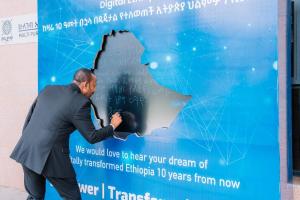
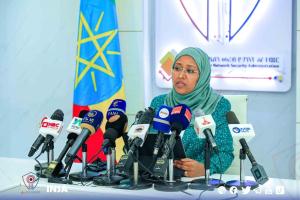

.png)
.jpg)

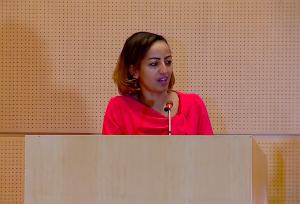
.jpg)

.jpg)
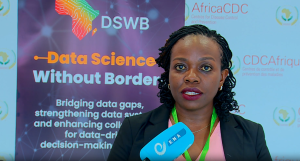
.png)
